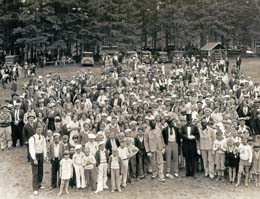Through the middle of the twentieth century, when hundreds of coal miners worked the coal mines of eastern King and Pierce counties, the annual Coal Miners' Picnic was a highlight of the summer for miners and their families. This People's History presents a description of the typical fare and activities at Miners' picnics written by William Kombol, Manager of Palmer Coking Coal Company. This is followed by an account of one of the largest Miners' picnics of the era, held by the Morris Brothers Coal Mining Company on July 16, 1933, which originally appeared in the Enumclaw Courier-Herald on July 21, 1933. The Palmer Coking Coal Co. is the successor to the Morris Brothers Coal Mining Company and William Kombol is a descendant of the Morris family.
Coal Miners' Picnic
One of the most anticipated events of the summer for coal miners and their families was the Coal Miners' Picnic. Coal miners, the mine operators, and their families would gather for a day of fun and relaxation. Typically held on a Saturday or Sunday in July or August, the miners' picnic would often kick off the annual two-week vacation that union miners enjoyed each summer when demand for coal was weak.
The picnics were jointly staged by the coal companies that operated the mines and the coal miners through their union, the United Mine Workers of America. The date would be set and ice cream, soda pop, and kegs of beer would be secured. Early on the morning of the picnic, volunteers would roast a beef or a small pig and barbeque turkeys. The venue was typically a resort location on a lake or river. In King County miners' picnics were often held at Nolte's resort on Deep Lake, Barrett's resort on Lake Retreat, or Flaming Geyser on the Green River.
The day's activities included foot races with cash prizes for the children, fun events like shoe-kicking contests, sack races using burlap coal sacks, egg tossing, wheelbarrow races, and the famous "Russian horse." The Russian horse consisted of a smooth, polished log supported by four legs. Two contestants would sit on this stationary "horse" trying to knock the other off by swinging a burlap bag filled with straw. Light-hearted grudges could be settled on the Russian horse. A tug-of-war with a heavy rope would pit the miners of different shifts or mines against each other with the winning team awarded a bottle of whiskey to be passed among the contestants until gone. With booze flowing, sometimes a fist fight or two would develop as the burly, hard-working miners would end a grievance that hadn't been settled underground.
Throughout the day, men would throw horseshoes and play baseball, children enjoyed free soda and ice cream, men drank keg beer, wives and mothers set out bountiful picnic lunches, while music was played on accordions or occasionally by a hired band. The picnic tables would be loaded with platters of fried chicken, barbequed and roast meats, heaps of potato salads and slaws, favorite casseroles, home-baked breads, rolls, desserts, watermelons, and other fresh fruit. If the resort had a dance hall, dancing would go on into the evening.
One of the largest miners' picnics of the era was held by the Morris Brothers Coal Mining Company on July 16, 1933. This story detailing the day's events and a photo of the four generations of the Morris family appeared in the July 21, 1933, issue of the Enumclaw Courier-Herald.
FOUR GENERATIONS OF PIONEER FAMILY PRESENT AT PICNIC
Four generations of the Morris family were on hand at Deep Lake last Sunday to entertain their hundreds of friends in King County with an all-day picnic.
The merrymakers began arriving early in the morning and continued in a steady stream until late afternoon. At eleven o'clock a long caravan of cars arrived from Seattle, led by State Highway Patrolmen Earl Ramage and Victor Pigg.
The entire day was replete with an unusually well balanced sports program, liberal cash prizes being awarded to the winners in each of the events. At noon a bountiful picnic dinner was served, consisting of fried chicken, barbecued meats and all the "trimmings." The Enumclaw band, directed by R. T. Montgomery, furnished music throughout the day. A professional minstrel troupe from Seattle added an hour of sidesplitting merriment in the afternoon. A colorful dance held in the lake pavilion in the evening concluded the day's festivities.
Since 1889 when George Morris became associated with the Wilkeson Coke & Coal Company, the activities of the family and succeeding generations have been closely allied with the coal mining industry in the state of Washington.
At the present time the Morris Brothers Coal Mining Company is operating in the vicinity of Cumberland, 55 men being employed steadily. Contracts recently closed with Seattle and Tacoma fuel dealers assure the steady operation throughout the summer with the promise of increased payrolls next winter.

